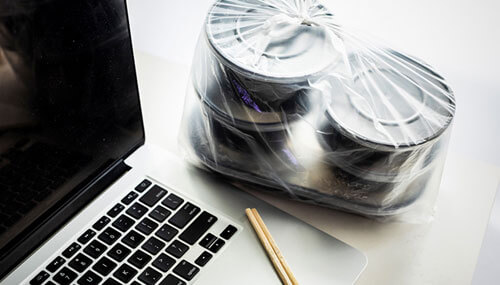US-Asia Business
Coronavirus Outbreak Spurs New Innovations in High Tech

From virtual offices to robotic vehicles, China’s high-tech companies are rolling out new features in response to the outbreak.
Chinese tech titans Baidu, Alibaba, Tencent, JD.com and DJI have all jumped on products and services to help consumers and businesses deal with the coronavirus crisis. They have cranked up new package delivery methods, inspection devices, fever monitors, online doctor consultations, disinfectant robots, and wrapped in fundamental technologies such as big data, facial recognition, artificial intelligence and digital mapping to make it all work.
Meanwhile, Chinese lifestyles have quickly adapted to a new virtual reality, from e-learning and e-commerce, to entertainment, video conferencing and remote working. Winners and losers are emerging. Since lockdowns and quarantines have been in effect, brick-and-mortar businesses such as restaurants, hotels and retail outlets, as well as travel, have been on the losing side.
Businesses that are seeing an uptick are those that are highly digitalized already, such as online entertainment, mobile payments, cloud computing and messaging apps. In the long term, this could lead to greater use of mobile, especially when it comes to less penetrated areas like grocery shopping, education and team management, points out Hans Tung, managing partner at GGV Capital.
Businesses go online
Virtual offices set up on collaboration platforms from China’s leading tech companies have become the default way of working and could linger past the crisis. Entertainment companies are launching new livestreaming genres meant for at-home audiences, such as cooking shows, karaoke and reality TV. Popular video platforms Douyin and Kuaishou have each gained between 100,000-500,000 new followers during just a two-week period beginning late January 2020. Online gaming is naturally booming too, and games with virus themes, like hunting to find cures, have even sprung up.
New online business models are springing up, as well, designed to adapt to the heightened fears of contagion. For instance, on-demand delivery in China has moved to designated bins instead of door-to-door. “We have seen a new form of e-commerce develop with contactless delivery,” said Michael Zakkour, founder and chief strategist at 5 New Digital in New York City. “This is helping to keep the online orders flowing.”

“We have seen a new form of e-commerce develop with contactless delivery…This is helping to keep the online orders flowing.”
Automation of transportation and logistics
Autonomous robot vehicles have been called into action, too. In the city of Wuhan, Chinese e-commerce giant JD.com has cranked up unmanned vehicles to bring food, medicine and other supplies to residents. From January 19 to 22, JD supplied over 126 million masks, 310,000 bottles of disinfectants and 1 million bottles of liquid soap to customers.
Both JD and Alibaba have opened special logistics channels to expedite transportation of medical supplies. Additionally, Alibaba’s logistics affiliate Cainiao launched another channel to deliver agricultural produce.
This push by Alibaba is part of the company’s longer-term vision to digitalize China’s logistics industry. This new channel relies on a recently developed Internet of Things platform with connected smart devices for streamlined deliveries. The aim is to digitalize parcels, warehouses, equipment, transportation vehicles and handheld devices of warehouse workers.
“Like all other companies in China, we were confronted with a Black Swan event soon after the start of 2020—the novel coronavirus. The outbreak is having significant impact on China’s economy and may potentially affect the global economy,” said Daniel Zhang, Alibaba executive chairman and CEO, during a recent earnings call with analysts. “It will present near-term challenges to the development of Alibaba’s businesses across the board, but at the same time, we will see opportunities created by the forces of change.”
Virtual health care
Baidu has launched a new “Fight Pneumonia” app channel to help the public get accurate and useful information from news sources and official announcements about the epidemic in real time. Going all in, Baidu is also offering its online medical advice platform for free to users who want consultations about SARS-CoV-2, the official name for the virus. More than 100,000 doctors across China have responded to questions via the online channel, which has handled over 15 million inquiries about the virus. Leveraging its AI capabilities, Baidu also has released an AI-powered intelligent heath care unit that responds to common questions through a conversational AI chatbot. This so-called intelligent “callbot” makes automated phone calls to ask people about their recent travels, health condition and contacts.
Moreover, Baidu Maps has launched a special page with mapping info showing real-time figures on confirmed cases and traffic details like road closures. The company’s heat map tracks the flow and density of people in business areas, hospitals, transport hubs or high-risk areas. Baidu’s map software also provides the location of clinics and hospitals.
Based on the company’s computer vision and thermal imaging technologies, Baidu has come up with a quick temperature monitoring system, checking for possible fevers of transit passengers. The system is designed to detect temperatures and recognize humans based on their forehead image. This is a highly practical invention, since so many people are wearing masks that cover other facial features. The system, which has been implemented on a Beijing subway line, sends a notification to station personnel to further inspect.
Alibaba and Tencent have also developed an app that assigns health ratings via a QR code. To enter office buildings, subways and shopping malls, the rating must be shown.
Chinese drone-maker DJI has developed a temperature-scanning model that comes equipped with a cotton swab. By acting as a reference to help calibrate the drone’s thermal imaging camera, the simple swab helps improve the drone’s temperature-measuring accuracy.
Robotics revolution
In these challenging times, robots are also being put to work in factories, warehouses and assembly operations. As part of the “Made in China 2025” plan, China has been undergoing a robotics revolution to upgrade manufacturing.
Now these robots are being tested at a new level, notes Duncan Turner, managing director of the HAX Accelerator in Shenzhen. One of its robotics startups, Youibot, provides maintenance and inspections for manufacturing, and has recently been retrofitted to tackle a new challenge: disinfections. Its robots have recently been sent to Suzhou to disinfect a large manufacturing plant.
“Our robot companies based in China are experiencing a huge increase in quotes for expanding production after the nCoV situation,” said Turner. “While these are still speculative, we anticipate a really big Q2 after a very slow Q1.”
As China and the world deal with this public health emergency, tech businesses are reacting with progressive solutions that could bring about greater digitalization within China, as well as new life and work patterns. During this crisis, China is proving to be a test bed and a leader in implementing these new technologies and business models.
Sign up for the Reach Further Newsletter
We’ll keep you in the know about the latest US-Asia business news and trends.
Suscríbase al boletín Reach Further
Lo mantendremos informado sobre las últimas noticias y tendencias comerciales entre Estados Unidos y China.

